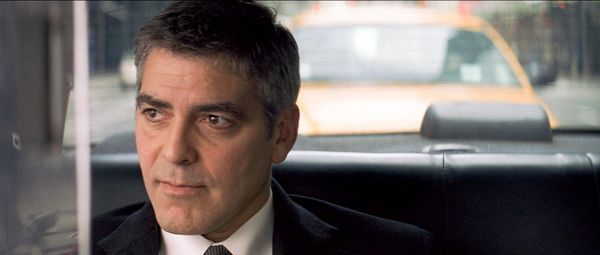Eye For Film >> Movies >> Michael Clayton (2007) Film Review

During one scene, high-powered corporate lawyer Karen Crowder (Tilda Swinton) practices answers for a coming interview. How do you achieve a work-life balance? The question, of course, could apply to us all.
Ideals versus the reality of paying a mortgage? Trapped in a fast lifestyle, you maybe realise what you are doing is less than perfect. How easily can you get out? (One might also ask, how do serious actors balance worthwhile projects against box-office returns? A question that seems to prompt the fluctuating choices of stars like Swinton and Clooney.)

By putting such an impasse at the heart of the movie, Michael Clayton becomes more than an edge-of-your-seat legal drama: it is a powerful psychological study that asks how far we will go to avoid facing unpalatable truths.
Michael Clayton (George Clooney) is an in-house 'fixer'. He works for a big New York law firm. He sorts out their dirty work. For instance, a big client is involved in a hit-and-run, or bad stories in the press need smoothed out. Clayton is good at his job. But discontented. Divorce, gambling addiction, failed business venture, loads of debt. No easy way out, even if he wanted one.
U-North is a large agrichemical company (think The Constant Gardener). Their in-house chief counsel is Karen. Karen wants to see off a multi-million dollar class action suit. Clayton's firm is employed to wind it all up nicely for her. But Clayton's colleague, the brilliant Arthur Edens (Tom Wilkinson), has an apparent mental breakdown. He strips off during a deposition, then tries to sabotage the entire case. Clayton goes in to 'fix' things, yet he is gradually forced to admit how good the firm has maybe become at making wrong seem right.
Much in the tradition of Erin Brockovich or even Syriana, this is a film that tries to attack the respected authorities while still working within the format of mainstream cinema. (More cynically, it uses high production values and scenes that last no longer than the attention span of passive audiences - supposedly the length of a TV commercial break.)
Directed by the man who wrote the Bourne trilogy, Michael Clayton racks up an intelligent suspense movie out of a plot nominally too dry for mass-market appeal. It reminds us of a world of imperatives we all succumb to. Maybe we don't always stop to question our jobs or their ethics too closely. Finish our overtime. Get reports ready for tomorrow. Close the deal. Have some private life. Let's leave philosophy for people with time on their hands. 'Nothing to do with me'.
This is a moral-dilemma-movie that could easily have failed and doesn't. Two hours of lawyer-talk could be enough to bore anyone, but the screenplay cleverly contrasts high-intensity scenes and well-developed characters. Arthur's psychotic ranting. Clooney's impenetrable cool. Swinton's prepared polish. These are displayed in the boardroom. Or uncomfortably restrained emotion in family scenes. The high-stakes backroom card game. Or the simple, almost documentary-like portrayal of one of the plaintiffs claiming damages from U-North.
Director Tony Gilroy is in no hurry to play all his cards. By the time murder enters the game, we are so engrossed that it seems like a natural progression.
Cinematography by Oscar-nominated Robert Elswit is crucial. Right from the start, we are torn by fascinating contrasts. A long panning shot through expensive, empty offices is coupled with a sound-over of manic rambling. Suddenly the camera wanders into a busy room. An annoying reporter is talking over the phone. And we overhear the phrase: "The time is now", which brings everything together in the present. Shortly afterwards, there's a horrific scene in which Clayton is almost killed. Then flashback four days to unravel a smoking gun that can overturn the lawsuit on which lives, careers and whole firms rely.
At one point, a shadow on the lower right of the screen could almost be an audience member standing up. As it advances, we see it is Clooney. His reality-check moment - one with which we have been subtly led to identify - then saves his life. The subsequent soul-searching and inner turmoil also provide one of Clooney's most rounded and complex performances to date. (Additional casting is spot-on, with Wilkinson and Swinton both excelling themselves.)
Clayton's ability to ask himself difficult questions is matched by Crowder's knack for self-deception. It is a frightening depiction of the legal mastery of words when she gives instructions for the most abominable acts with total deniability.
Although the overly obvious Blackberry product-placement annoyed me slightly, I found Michael Clayton a satisfying film without any of the usual over-simplified characters. Threads are pulled together a bit too conveniently towards the end, but it succeeds in never seeming contrived. If you have always put off thinking too deeply about where your own life is heading, it might even give you a necessary nudge. But as all-round entertainment for a thinking audience, Michael Clayton is one of this summer's better movies.
Reviewed on: 01 Oct 2007




















